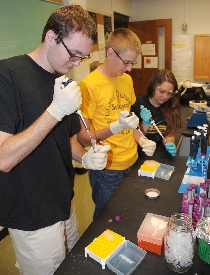Grant Funding Brings Three Local High School Students Into WIU Science Labs
June 21, 2013

Students Abe Matlak, Dexter Redenius and Ali Kerr work in one of the laboratories in Waggoner Hall recently.
[Download Print-Quality Image]
MACOMB, IL – Three local high school students are spending their summer in the biology laboratories at Western Illinois University thanks to a grant from the National Science Foundation (NSF).
The students, Abe Matlak, a recent Macomb High School graduate, and Ali Kerr and Dexter Redenius, of Southeastern High School in Augusta are working with Assistant Professor Andrea Porras-Alfaro, Assistant Professor Sue Hum Musser and Professor Richard Musser, all from Western's Department of Biological Sciences.
The students are spending most of their time in the WIU labs learning a range of techniques, including molecular biology methods. Porras-Alfaro said many of the techniques are advanced and typically utilized by senior-level college students and graduate students.
During the last week in June, the students and Porras-Alfaro will spend time in New Mexico doing field study to collect plant samples, and visiting and working in the laboratories at the University of New Mexico.
For at least some of the students, this summer isn't their first time in a WIU lab. Some have spent multiple summers working on campus biology projects.
Matlak , who will attend the University of Illinois this fall to study biology, said his experience in the lab this summer and last has been a beneficial to moving him further ahead in his studies.
"Junior undergraduate students in some institutions typically are washing dishes and plating things, and this has allowed me to do actual work in a research lab," Matlak said.
Through his work at WIU, Matlak was named a 2013 finalist in the Illinois Junior Academy of Sciences and a finalist to attend the INTEL International Science Fair.
His competition project involved studying fungal diversity in soybean nodules in drought conditions. Matlak isolated and identified the fungi using molecular methods.
Redenius, a junior, said the laboratory experience helps him move beyond his high school studies and helps with his goal of working in the engineering field.
Kerr, a senior, said she appreciates that the trio is having an experience not many people get to have.
"I want to be a zoologist or a veterinarian, and this is good experience for that," she said
Redenius and Kerr worked together on a project through their lab work, and they have competed in regional and state science fairs. Their work was named among the top five state projects in the Future Farmers of America Science Fair and the top five University of Illinois projects at the same competition.
The project Redenius and Kerr submitted together for the competitions involved the germination of corn seeds and looking at the effect of fungi and pollen in regular and drought conditions on corn germination and growth.
Redenius also worked on a project involving corn fungi and won numerous awards at regional and state science fairs.
Currently, the pair is studying corn roots from organic and traditional farms and testing fungal isolates to improve plant growth.
Porras-Alfaro said the $15,000 in funding for the RAHSS-NSF program is thanks to an add-on for an existing WIU grant from the NSF.
"We are so happy to have the students here," she said. "They are working in the lab with us and our graduate students and it allows for very good interactions. It also allows the (high school) students to visualize where they want to go."
The students will rotate around to several WIU laboratories throughout the summer.
The grant funding will pay for the students' New Mexico trip, a small stipend for their summer work and the supplies they use in the labs.
Porras-Alfaro said the research the students are doing will be used to apply for additional grant funding for future projects at WIU. Some of the students' findings were used recently to apply for and receive a $7,000 grant for further plant studies.
The students are also collaborating on at least two scholarly articles that will be submitted for publication to academic journals. If published, the students will be listed as co-authors.
Posted By: Jodi Pospeschil (JK-Pospeschil@wiu.edu)
Office of University Communications & Marketing

Connect with us: